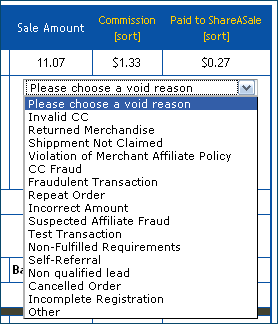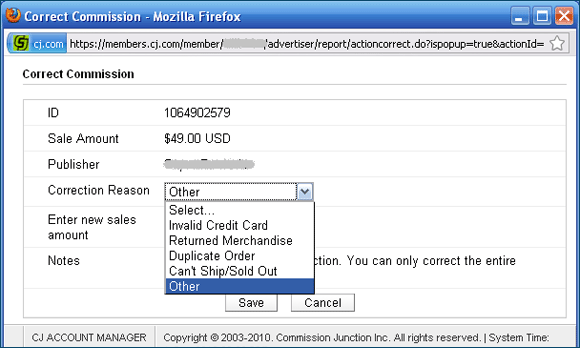Reversals happen. They happen to merchants, and by extension, they hit affiliates too. Of course, affiliates love programs with “no reversals” policies, but if you, as a merchant, aren’t ready to offer one, I strongly encourage you to at least stick to the following 3 best practices:
1) Locking Periods — Set the locking period in a way that both gives you enough time to react to your customers’ returns and cancellations, but doesn’t stretch this time beyond the sensible time period required for you to apply the corrections/changes. After all, affiliates don’t get any certainty on their earnings until that commission locks in their account.
2) Explanations — Always provide affiliates with detailed (even if eloquent) info on the reason for the reversal (e.g.: invalid credit card, return/cancellation, duplicate order, customer fraud, affiliate fraud, non-qualified lead or non-fulfilled order requirements, test transaction, etc). Affiliates have the right to know what’s going on. Reversals without explanations are a sure route to disaster.
Below you may see how affiliate commission reversal/correction options look on ShareASale and Commission Junction respectively (frankly, I love ShareASale’s options better, especially the fact that when choosing “Other” you can manually enter your own reason):


3) Keeping Your Word — Whatever your commission reversal policy says, stick to it! If you get a customer that stays with your service for 3 months and then cancels their membership, but your risk-free trial period is set at 30 days (within which they didn’t go away), and your affiliate commission locking period is 40 days, there is no reason whatsoever to even think of reversing the affiliate commission. I’ve had this situation come up just yesterday.
As always, if you have any suggestions about this topic (as an affiliate, merchant, or affiliate program manager), your comments are warmly welcomed.
I can see why you prefer ShareASale!
As always great info, Geno. We’re seeing more merchants embrace a “no reversal on returns” policy…but these merchants understandably still acknowledge they will post reversals for fraud and/or canceled orders. These types of progressive terms attract and retain good Affiliates, so it’s definitely worth considering IMO…esp if your store already has a low return rate.
I would argue the “no reversal on returns” policy is reasonable and fair for two reasons:
1) If an Affiliate generates a sale they have done their job of sending a paying customer. It’s unlikely a return was a result of anything the Affiliate did.
2) Paying a commission on returned merchandise is a small price to pay for acquiring a new customer…which would very likely be the scenario. Affiliates do not get the credit they deserve for being new customer acquisition tools.
My two cents 😉
Good points, Gary. I too believe that a “no reversals” policy is a good way to go — one which shows that an affiliate program is truly affiliate-friendly, and will reward the deserving affiliate regardless.
I think there should be some minimums, too. For example, I had a $0.27 commission reversed recently. While the $0.27 won’t make or break me, seeing it reversed did leave a sour taste in my mouth. Why annoy an affiliate, for $0.27? Program managers should keep this in mind, when reversing sales.
Very good point, Eric. I personally always tell merchants to leave smaller commissions unreversed. Is demotivation of an affiliate worth the amount you’ll “save”?!